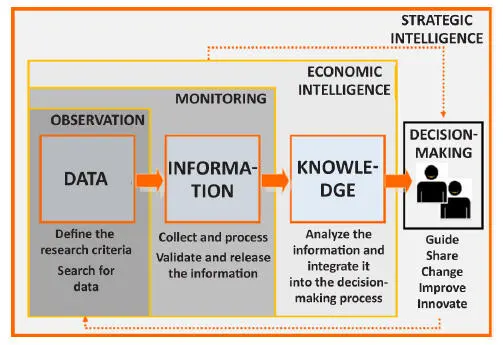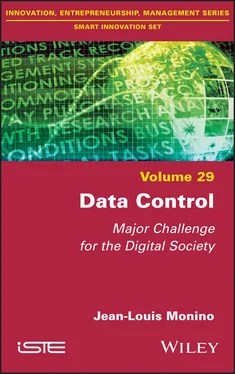Jean-Louis Monino - Data Control
Здесь есть возможность читать онлайн «Jean-Louis Monino - Data Control» — ознакомительный отрывок электронной книги совершенно бесплатно, а после прочтения отрывка купить полную версию. В некоторых случаях можно слушать аудио, скачать через торрент в формате fb2 и присутствует краткое содержание. Жанр: unrecognised, на английском языке. Описание произведения, (предисловие) а так же отзывы посетителей доступны на портале библиотеки ЛибКат.
- Название:Data Control
- Автор:
- Жанр:
- Год:неизвестен
- ISBN:нет данных
- Рейтинг книги:3 / 5. Голосов: 1
-
Избранное:Добавить в избранное
- Отзывы:
-
Ваша оценка:
- 60
- 1
- 2
- 3
- 4
- 5
Data Control: краткое содержание, описание и аннотация
Предлагаем к чтению аннотацию, описание, краткое содержание или предисловие (зависит от того, что написал сам автор книги «Data Control»). Если вы не нашли необходимую информацию о книге — напишите в комментариях, мы постараемся отыскать её.
Data Control — читать онлайн ознакомительный отрывок
Ниже представлен текст книги, разбитый по страницам. Система сохранения места последней прочитанной страницы, позволяет с удобством читать онлайн бесплатно книгу «Data Control», без необходимости каждый раз заново искать на чём Вы остановились. Поставьте закладку, и сможете в любой момент перейти на страницу, на которой закончили чтение.
Интервал:
Закладка:
As an example, access to data allows quantitative and qualitative analyses to be enriched. We can analyze customer contacts with data collected by a call center, as well as offer this kind of product in limited numbers as E2S-Conseils does. Indeed, the web offers immense information possibilities, Internet users demand clear, precise and immediate information. The responsiveness of the demand for information is a key point in this type of demand. Indeed, it is often necessary to wait to have a more than disappointing result. The start-up E2S-Conseils and the TRIS laboratory of the University of Montpellier are developing an innovative service based on a community platform to buy and sell multi-product and multi-country contacts and appointments.
According to Taylor, the value of information begins with a piece of data, which acquires value as it evolves, to achieve the objective and specify an action for decision-making. Information is a message with a higher level of meaning. It is a raw data that the subject then transforms into knowledge through a cognitive or intellectual operation.
Companies are very aware of the importance of knowledge and even more so of how to “manage”, enrich and benefit from it. Beyond all the factors (financial, technical and other), the knowledge that the company possesses also represents an important survival factor. Whether it is market knowledge, legal, technological, normative or other information.
This implies that in the information cycle, the data collected should be optimized so that needs are identified instantly and processed as quickly as possible. This will highlight the interaction between a multitude of actors (decision-makers, analysts, advisers, technicians, etc.) within the framework of a group dynamic and will allow the complementarity of knowledge, to improve understanding, analysis of situations, and production of information necessary for action. Indeed, “The quality of the production of knowledge for operational purposes depends on the skills of interpretation and analysis of the human factor in collective problem-solving situations” (Bulinge 2006, 2007).
1.2.2.2. From data to information: monitoring
Business intelligence concerns data collection, whereas business intelligence is a request from the company's management to know its environment. Of course, economic intelligence must mobilize human and financial means, but it also calls upon working methods, computerized or not, tools for collecting and especially analyzing these data. The data once collected, verified, processed and validated becomes strategic information of the company. The company manager must be able to find the necessary support when the decision is taken. This procedure makes it possible to consider:
– a set of possibilities;
– execution constraints;
– simulations to calculate indicators of success and failure.
In her research in 2008, Lesca addresses the problem of interpreting data to transform it into strategic information or knowledge. Interpretation systems, the heart of the “business intelligence” process, are defined as the set of “systems for attributing meaning” to the information that the company receives, manipulates and preserves (Baumard and Benvenuti 1998).
1.2.2.3. From intelligence to economic intelligence
“Monitoring” involves gathering, storing and sharing information according to identified needs and predefined procedures. In our concept, monitoring brings data together and transforms it into information and its transformation into useful data.
“Economic Intelligence” allows the analysis of the information obtained and prospective thinking to anticipate changes and make decisions in accordance with the economic environment. But it is also the perception of its environment, the identification of market developments, strategic adaptation, innovation and sales growth, the opening of new markets and the development of the company. Finally, it is information security, data protection, risk anticipation and, therefore, the control of its information system.
All the fields that complement Business Intelligence, such as knowledge management, information protection and lobbying, can be grouped together in the overall concept of Strategic Intelligence.
1.2.2.4. Information
Information is data that has been recorded, classified, organized, linked and interpreted within the context of a specific study. The exploitation of the collected data requires sorting, verification, processing, analysis and synthesis. It is through this process that the raw data collected during the research will be transformed into information. This data processing process provides accessible information for decision-making.
1.2.2.5. From information to knowledge: economic intelligence
Information is at the heart of Business Intelligence (Monino 2012b) and its strategic management has become one of the key drivers of overall business performance. Indeed, the process of globalization of markets forces economic agents to adapt to the new balances that are being established between competition and cooperation. From now on, the management of industrial strategies is largely based on the ability of companies to access strategic information to better anticipate future markets and competitors' strategies.
1.2.2.6. Knowledge
Knowledge is the extension of information, to which value is added because it is based on intention. It is a specifically human phenomenon that concerns thinking in its active and contextual relational frameworks. It represents an acquisition of information that is translated by the human factor and requires analysis and synthesis to assimilate, integrate, criticize and admit new knowledge.
1.2.2.7. From knowledge to decision-making: strategic business intelligence
Economic foresight concerns the collection of information, while competitive intelligence is a request from the company's management to know, and control as far as possible, the dynamics of its environment. Of course, economic intelligence must not only mobilize means, both human and financial, but it also requires working methods and tools, computerized or not, for the collection and especially the analysis of this information. Information thus becomes one of the strategic raw materials of the company and the person in charge of a company must be able to find the necessary help within his staff or externally when taking strategic decisions.
The wave of computerization that has swept over our societies is now reaching a form of maturity, which means that entry into the knowledge society represents a plunge into an ocean of information. The development of related technologies, with the advent of the Internet and networks, has increased the volumes available.
The stakes in the era of the “data revolution” are focused on the integration and enhancement of data. This phenomenon is part of a new approach to the “economy of the immaterial”. It mobilizes knowledge and information, and highlights the importance of “Data”. “Big Data”, “Open Data”, [...] “Data” is everywhere - we produce it every day - and is carried by smartphones, tablets, [...] and is accessible by anything and everyone. Its mass arrival is upsetting traditional management practices.

Figure 1.3. From data to decision-making strategic intelligence (source: Monino and Lucato 2005, Conference Fondation Maison du Maroc Paris October 2019 “Economic intelligence and data control in the digital world”). For a color version of this figure, see www.iste.co.uk/monino/control.zip
Читать дальшеИнтервал:
Закладка:
Похожие книги на «Data Control»
Представляем Вашему вниманию похожие книги на «Data Control» списком для выбора. Мы отобрали схожую по названию и смыслу литературу в надежде предоставить читателям больше вариантов отыскать новые, интересные, ещё непрочитанные произведения.
Обсуждение, отзывы о книге «Data Control» и просто собственные мнения читателей. Оставьте ваши комментарии, напишите, что Вы думаете о произведении, его смысле или главных героях. Укажите что конкретно понравилось, а что нет, и почему Вы так считаете.












